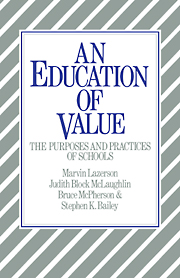Chapter 1 - The expectations of schooling
Published online by Cambridge University Press: 05 June 2012
Summary
We have always expected so many contradictory things from our public schools. We have turned to public education to secure a common citizenship and a common morality in a pluralist society, but have often found that this common morality abuses our religious beliefs or ethnic values. We have expected public schools to enhance economic productivity and individual economic opportunity, but have complained that such an emphasis exacerbates individualism and materialism. We have believed that public schools should be cosmopolitan and should share in the nation's goals, but we have also insisted that the educational system be decentralized and that schools be responsive to local values. We have asked public school teachers to assume more tasks and to be responsible professionals, but we underpay them, devalue their work, and blame them for failing to achieve what may be impossible expectations.
Our expectations for education have led us to extend schooling to more and more people for longer periods of time. The commitment to popularization and the expansion of opportunity have crossed social class, racial, and gender lines. Laborers, artisans, farmers, manufacturers, and professionals, whites and nonwhites, immigrants and native-born, women and men have all, at various times, sought to expand schooling for themselves, for their children, and for the children of others.
Yet, the expectations themselves have also been the source of tension and conflict. Sometimes the hopes have been too grandiose, more than should legitimately be expected of any single institution.
- Type
- Chapter
- Information
- An Education of ValueThe Purposes and Practices of Schools, pp. 3 - 22Publisher: Cambridge University PressPrint publication year: 1985

